How to Know If Baby Inhaled Bath Water: Essential Signs to Watch For
To know if a baby has inhaled bath water, be attentive for immediate signs such as coughing, gagging, and difficulty breathing. It is important to monitor the baby closely for any changes in their breathing and seek medical attention if there are any concerns.
Remember to keep the baby in an upright position and call an ambulance immediately if necessary.

Credit: www.pregnancybirthbaby.org.au
Understanding The Risks
Bathing your baby can be a special bonding time, but it’s important to be aware of the potential risks associated with bathwater inhalation. While it’s uncommon for a baby to inhale bathwater, it can happen under certain circumstances. Understanding these risks is crucial for ensuring your baby’s safety and well-being.
Causes Of Baby Inhaling Bath Water
Babies may accidentally inhale bathwater due to a variety of reasons. Some common causes include:
- Baby splashing or kicking vigorously, causing water to enter their nose or mouth
- Tilting their head back too far during bath time, allowing water to enter their airway
- Accidentally submerging their face in the water
Importance Of Recognizing The Signs
Recognizing the signs of a baby inhaling bathwater is essential for prompt action and preventing potential health issues. Some indicators to watch out for include:
- Coughing or choking
- Difficulty breathing or wheezing
- Excessive fussiness or irritability
- Vomiting or regurgitation
If you notice any of these signs, it’s important to seek medical attention immediately to ensure your baby’s well-being.
Potential Health Issues
Inhaling bathwater can lead to potential health issues in babies. While rare, these complications may include:
- Spasms of the vocal cords, resulting in difficulty breathing
- Irritation of the airways or lungs
- Infection or pneumonia
It’s crucial to stay vigilant and address any concerns promptly to minimize the risk of these complications.
Immediate Signs To Watch For
Knowing the immediate signs to watch for if your baby inhales bath water is crucial for their safety. As a parent, it’s important to be vigilant and recognize these signs to ensure prompt action. Here are three immediate signs to watch for:
Coughing And Gagging
Coughing and gagging are common immediate signs that your baby may have inhaled bath water. If your baby starts coughing vigorously or is gagging excessively after being in the water, it is a cause for concern. This can indicate that water has entered their airways, and their body’s natural response is to clear it out. It’s essential to monitor your baby closely and seek medical attention if the coughing or gagging persists or worsens.
Difficulty Breathing
Difficulty breathing is another immediate sign that your baby may have inhaled bath water. If your baby is experiencing shortness of breath, wheezing, or chest pain, it could indicate that water has entered their lungs. This can lead to respiratory distress, which requires immediate medical attention. Pay close attention to any changes in your baby’s breathing patterns and seek help if you notice any unusual symptoms.
Discolored Lips And Skin
Discoloration of the lips and skin is an alarming immediate sign that your baby may have inhaled bath water. If you notice that your baby’s lips or skin turn bluish or pale after being in the water, it could be a sign of oxygen deprivation. When water enters the airways, it can obstruct the flow of air, causing a lack of oxygen. This condition requires immediate medical attention to ensure your baby’s well-being.
Remember, if you notice any of these immediate signs, it’s crucial to act quickly and seek medical help. Delaying medical intervention can lead to further complications. Always prioritize your baby’s safety and well-being when it comes to water-related incidents.
Delayed Symptoms To Be Aware Of
After a baby inhales bath water, it’s essential to be aware of the delayed symptoms that may indicate potential respiratory issues. It’s important to remember that these symptoms may not appear immediately, which is why it’s crucial to stay vigilant and monitor your baby closely after any incident. Recognizing and understanding these symptoms can help you seek prompt medical attention if necessary.
Vomiting
Vomiting is one of the delayed symptoms that can occur after a baby inhales bath water. This can happen as a result of the water irritating the baby’s airways or causing a coughing reflex. If your baby vomits after a bath, it’s important to pay attention to their breathing and overall well-being.
Shortness Of Breath
Shortness of breath can be another sign that your baby may have inhaled bath water. If you notice your baby having difficulty breathing or breathing rapidly after a bath, it could indicate that water has entered their airways. It’s important to seek medical attention immediately if your baby experiences severe shortness of breath or shows signs of distress.
Wheezing
Wheezing is an abnormal sound that can be heard when the airways are narrowed or blocked. If your baby starts wheezing after inhaling bath water, it may indicate that the water has caused inflammation or irritation in their airways. Wheezing should not be ignored and should prompt medical evaluation.
Chest Pain
Chest pain may also be a delayed symptom of inhaling bath water. This can occur due to the water causing irritation or inflammation in the baby’s airways or lungs. If your baby displays signs of discomfort or pain in the chest area after a bath, it’s important to seek medical advice.
Remember, if you suspect that your baby inhaled bath water and they display any of these delayed symptoms, it’s crucial to seek medical attention promptly. Early detection and treatment can help prevent complications and ensure your baby’s well-being.
What To Do If Baby Inhaled Bath Water
Discovering that your baby has inhaled bath water can be frightening and stressful for parents. However, it is important to stay calm and assess the situation before taking any action. Here are some steps to follow if you suspect your baby has inhaled bath water.
Stay Calm And Assess The Situation
The first thing to do is to stay calm. Panicking may alarm your baby further, so it is crucial to remain composed. Assess the situation by observing your baby’s behavior and breathing patterns. Look for any signs of distress or discomfort, such as coughing, wheezing, or breathing difficulties.
How To Provide Immediate Help
Once you have assessed the situation and determined that your baby has indeed inhaled bath water, there are a few immediate steps you can take to provide help:
- Position your baby upright: Holding your baby upright can help facilitate better breathing and relieve any potential discomfort caused by the water inhalation.
- Gently pat your baby’s back: Lightly patting your baby’s back can assist in clearing any water that may be trapped in their airways. However, be sure to use gentle and controlled movements to avoid causing any harm.
- Monitor their breathing: Keep a close eye on your baby’s breathing. If you notice any persistent difficulties or signs of distress, it is important to seek medical attention immediately.
When To Seek Medical Attention
While most cases of babies inhaling bath water resolve on their own without complications, there are situations where medical attention is necessary. Here are some signs that indicate the need for professional evaluation:
- Persistent coughing or wheezing
- Difficulty breathing
- Bluish discoloration of the lips or face
- Extreme fatigue or lethargy
- Unusual behavior or irritability
If your baby exhibits any of these symptoms or if you have any concerns about their well-being, it is advisable to contact your pediatrician or seek immediate medical attention. Remember, it is always better to err on the side of caution when it comes to your baby’s health.
Knowing what to do if your baby inhales bath water can help you respond promptly and appropriately in such a situation. By staying calm, providing immediate help, and seeking medical attention when necessary, you can ensure your baby’s well-being and health.
Preventing Baby From Inhaling Bath Water
If you suspect that your baby has inhaled bath water, look out for signs such as coughing, shortness of breath, wheezing, and chest pain. It is important to monitor them closely and seek medical attention if needed.
Choosing The Right Bathing Techniques
When it comes to preventing your baby from inhaling bath water, choosing the right bathing techniques is crucial. Start by selecting a baby bathtub that is specifically designed to keep your little one safe and secure during bath time. These tubs often come with supportive inclined positions that prevent your baby from sliding down into the water. Additionally, make sure to fill the tub with the correct amount of water – not too high or too low.
Implementing Safety Measures
Implementing safety measures is essential to minimize the risk of your baby inhaling bath water. Always ensure that the water temperature is suitable for your baby – not too hot or cold. Use a bath thermometer to accurately measure the water temperature. It is also advisable to install non-slip mats in the tub to prevent any accidents or slipping. Keep all bath essentials like soap, lotion, and towels within reach but away from the water to avoid any dangerous situations.
Monitoring Baby During Bath Time
Monitoring your baby during bath time is of utmost importance. Never leave your baby unattended, even for just a few seconds. Keep one hand on your baby at all times to ensure they stay safe. Pay attention to any signs of distress or discomfort, such as coughing, choking, or excessive splashing. If your baby accidentally inhales bath water, it is crucial to act immediately and seek medical attention if necessary. Notifying your pediatrician about the incident can help ensure your baby’s health and well-being.
Frequently Asked Questions Of How To Know If Baby Inhaled Bath Water
What Happens If Baby Inhales Water During Bath?
When babies inhale water during a bath, it can cause their vocal cords to spasm and close up, making it difficult to breathe. This can happen right away and not days later. It’s important to watch for signs such as coughing, gagging, vomiting, shortness of breath, wheezing, and chest pain.
If you suspect your baby has inhaled water, monitor their breathing and seek medical help if needed.
How Fast Do Dry Drowning Symptoms Appear?
Dry drowning symptoms can appear right away after inhaling water and include spasms in the vocal cords that cause the airways to shut off, making breathing difficult. It is important to be vigilant and seek immediate medical attention if you notice these signs.
How Do I Know If My Child Inhaled Too Much Water?
If your child has inhaled too much water, you may notice immediate signs such as coughing, gagging, vomiting, shortness of breath, wheezing, or chest pain. It is important to monitor their breathing and seek medical attention if necessary. Secondary drowning is rare but can be deadly if unrecognized.
Stay vigilant and ensure water safety for your child.
How Common Is Secondary Drowning In Babies?
Secondary drowning is relatively rare in babies. Most incidents in the pool or with waves are easily resolved. However, if secondary drowning goes unnoticed, it can be fatal. It is essential to remain vigilant and watch for any signs of distress in your baby.
Conclusion
If you’re wondering how to know if your baby inhaled bath water, it’s important to be aware of the signs. Remember, in cases of dry drowning, the water doesn’t reach the lungs but can cause the vocal cords to spasm, making it difficult for your child to breathe.
Watch out for immediate signs of distress such as coughing, gagging, vomiting, shortness of breath, wheezing, or chest pain. Keep a close eye on your baby, and if you notice any concerning symptoms, seek medical attention immediately.








